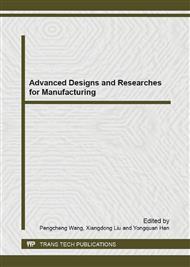[1]
M. Pinedo, Scheduling: Theory, Algorithms, and Systems, Springer, (2008).
Google Scholar
[2]
S. Browne and U. Yechiali. Dynamic priority rules for cyclic type queues. Advances in Applied Probability Vol. 10 (1989), pp.432-450.
DOI: 10.2307/1427168
Google Scholar
[3]
A.S. Kunnathur and S.K. Gupta. Minimizing the makespan with late start penalties added to processing times in a single facility scheduling problem. European Journal of Operational Research Vol. 47 (1990), pp.56-64.
DOI: 10.1016/0377-2217(90)90089-t
Google Scholar
[4]
W. Kubiak and S.L. van de Velde. Scheduling deteriorating jobs to minimize makespan. Naval Research Logistics Vol. 45 (1998), pp.511-523.
DOI: 10.1002/(sici)1520-6750(199808)45:5<511::aid-nav5>3.0.co;2-6
Google Scholar
[5]
G. Mosheiov. Multi-machine scheduling with linear deterioration. INFOR Vol. 36 (1998), pp.205-214.
DOI: 10.1080/03155986.1998.11732359
Google Scholar
[6]
C.Y. Low, C. -J. Hsu and C. -T. Su. Minimizing the makespan with an availability constraint on a single machine under simple linear deterioration. Computers and Mathematics with Applications Vol. 56 (2008), pp.257-265.
DOI: 10.1016/j.camwa.2007.12.006
Google Scholar
[7]
S. Brown and U. Yechiali. Scheduling deteriorating jobs on a single process. Operations Research Vol. 38 (1990), pp.495-498.
DOI: 10.1287/opre.38.3.495
Google Scholar
[8]
C. Zhao, Q. Zhang and H. Tang. Scheduling problems under linear deterioration. Acta Automatica Sinica Vol. 29 (2003), pp.531-535.
Google Scholar
[9]
J. -B. Wang and Z. -Q. Xia. Scheduling jobs under decreasing linear deterioration. Information Processing Letters Vol. 94 (2005), pp.63-69.
DOI: 10.1016/j.ipl.2004.12.018
Google Scholar
[10]
C. -C. Wu, W. -C. Lee and Y. -R. Shiau. Minimizing the total weighted completion time on a single-machine under linear deterioration. International Journal of Advanced Manufacturing Technology Vol. 33 (2007), pp.1237-1243.
DOI: 10.1007/s00170-006-0565-8
Google Scholar
[11]
W. -C. Lee, C. -C. Wu and H. -C. Liu. A note on single-machine makespan problem with general deteriorating function. International Journal of Advanced Manufacturing Technology Vol. 40 (2009), pp.1053-1056.
DOI: 10.1007/s00170-008-1421-9
Google Scholar
[12]
B. Alidaee and N.K. Womer. Scheduling with time dependent processing times: review and extensions. Journal of the Operational Research Society Vol. 50 (1999), pp.711-720.
DOI: 10.1057/palgrave.jors.2600740
Google Scholar
[13]
T.C.E. Cheng, Q. Ding and B.M.T. Lin. A concise survey of scheduling with time-dependent processing times. European Journal of Operational Research Vol. 152 (2004), pp.1-13.
DOI: 10.1016/s0377-2217(02)00909-8
Google Scholar
[14]
C. -L. Zhao and H. -Y. Tang. Single machine scheduling problems with deteriorating jobs. Applied Mathematics and Computation Vol. 161 (2005), pp.865-874.
DOI: 10.1016/j.amc.2003.12.073
Google Scholar
[15]
Y. Yang, D. -Z. Wang, D. -W. Wang, W.H. Ip and H. -F. Wang. Single machine group scheduling problems with the effects of deterioration and learning. Acta Automatica Sinica Vol. 35 (2009), pp.1290-1295.
DOI: 10.1016/s1874-1029(08)60110-x
Google Scholar
[16]
V.C.Y. Zhu, L.Y. Sun, L.H. Sun and X.H. Li. Single machine scheduling time-dependent jobs with resource dependent ready times. Computers & Industrial Engineering Vol. 58 (2010), pp.84-87.
DOI: 10.1016/j.cie.2009.08.006
Google Scholar
[17]
D. Wang, M. -Z. Wang and J. -B. Wang. Single-machine scheduling with learning effect and resource-dependent processing times. Computers & Industrial Engineering Vol. 59 (2010), pp.458-462.
DOI: 10.1016/j.cie.2010.06.002
Google Scholar
[18]
W. -H. Kuo and D. -L. Yang. A note on due-date assignment and single-machine scheduling with deteriorating jobs. Journal of the Operational Research Society Vol. 59 (2008), pp.857-859.
DOI: 10.1057/palgrave.jors.2602396
Google Scholar
[19]
M.D. Toksa and E. Guner. Minimizing the earliness/tardiness costs on parallel machine with learning effects and deteriorating jobs: a mixed nonlinear integer programming approach. International Journal of Advanced Manufacturing Technology Vol. 38 (2008).
DOI: 10.1007/s00170-007-1128-3
Google Scholar
[20]
V. S. Gordon and V. A. Strusevich. Single machine scheduling and due date assignment with positionally dependent processing times. European Journal of Operational Research Vol. 198 (2009), P. 57-62.
DOI: 10.1016/j.ejor.2008.07.044
Google Scholar
[21]
A. Rudek and R. Rudek. A note on optimization in deteriorating systems using scheduling problems with the aging effect and resource allocation models. Computers & Mathematics with Applications Vol. 62 (2011), P. 1870-1878.
DOI: 10.1016/j.camwa.2011.06.030
Google Scholar
[22]
C. -L. Zhao and H. -Y. Tang. A note to due-window assignment and single machine schedulingwith deteriorating jobs and a rate-modifying activity. Computers & Operations Research Vol. 39 (2012), P. 1300-1303.
DOI: 10.1016/j.cor.2010.04.006
Google Scholar
[23]
K. R. Baker and G. D. Scudder. Sequencing with earliness and tardiness penalties: A review. Operations Research Vol. 38 (1990), pp.22-36.
DOI: 10.1287/opre.38.1.22
Google Scholar
[24]
T.C.E. Cheng and M.C. Gupta. Survey of scheduling research involving due date determination decisions. European Journal of Operational Research Vol. 38 (1989), pp.156-166.
DOI: 10.1016/0377-2217(89)90100-8
Google Scholar
[25]
V. Gordon, J.M. Proth and C. Chu. A survey of the state-of-the-art of common due date assignment and scheduling research. European Journal of Operational Research Vol. 139 (2002), pp.1-25.
DOI: 10.1016/s0377-2217(01)00181-3
Google Scholar
[26]
V. Lauff and F. Werner. Scheduling with common due date, earliness and tardiness penalties for multimachine problems: A survey. Mathematical and Computer Modelling Vol. 40 (2004), pp.637-655.
DOI: 10.1016/j.mcm.2003.05.019
Google Scholar
[27]
A. Bachman and A., Janiak. Scheduling deteriorating jobs dependent on resources for the makespan minimization. Operations Research Proceedings 2000: Selected Papers of the Symposium on Operations Research, Dresden, September, pp.29-34.
DOI: 10.1007/978-3-642-56656-1_5
Google Scholar
[28]
K.R. Baker and G.D. Scudder. Sequencing with earliness and tardiness penalties: a revlew. Operations Research Vol. 38 (1990), pp.22-36.
DOI: 10.1287/opre.38.1.22
Google Scholar
[29]
R.L. Graham, E.L. Lawler, J.K. Lenstra and A.H.G. Rinnooy Kan. Optimization and approximation in deterministic sequencing and scheduling: A survey. Annals of Discrete Mathematics Vol. 5 (1979), pp.287-326.
DOI: 10.1016/s0167-5060(08)70356-x
Google Scholar
[30]
S.S. Panwalkar, M.L. Smith and A. Seidman. Common due date assignment to minimize total penalty cost for the one machine scheduling problem. Operarions Research, Vol. 30 (1982), pp.391-399.
DOI: 10.1287/opre.30.2.391
Google Scholar
[31]
P. Brucker. Scheduling Algorithm. Springer-Verlag, Berlin (2004).
Google Scholar
[32]
C. -J. Hsu, T.C.E. Cheng and D. -L. Yang. (2011). Unrelated parallel-machine scheduling with rate-modifying activities to minimize the total completion time. Information Sciences Vol. 181 (2011), pp.4799-4803.
DOI: 10.1016/j.ins.2011.06.010
Google Scholar


